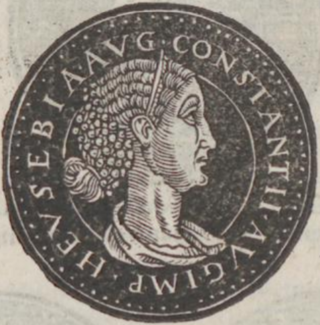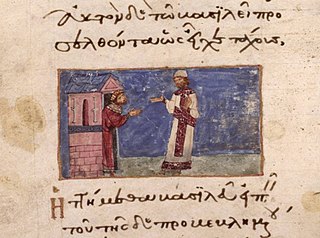Ammianus Marcellinus, occasionally anglicised as Ammian, was a Roman soldier and historian who wrote the penultimate major historical account surviving from antiquity. His work, known as the Res gestae, chronicled in Latin the history of Rome from the accession of the Emperor Nerva in 96 to the death of Valens at the Battle of Adrianople in 378, although only the sections covering the period 353 to 378 survive.

Constantius II was Roman emperor from 337 to 361. His reign saw constant warfare on the borders against the Sasanian Empire and Germanic peoples, while internally the Roman Empire went through repeated civil wars, court intrigues, and usurpations. His religious policies inflamed domestic conflicts that would continue after his death.

Julian was the Caesar of the West from 355 to 360 and Roman emperor from 361 to 363, as well as a notable philosopher and author in Greek. His rejection of Christianity, and his promotion of Neoplatonic Hellenism in its place, caused him to be remembered as Julian the Apostate in Christian tradition. He is sometimes referred to as Julian the Philosopher.

Valentinian I, sometimes called Valentinian the Great, was Roman emperor from 364 to 375. He ruled the Western half of the empire, while his brother Valens ruled the East. During his reign, he fought successfully against the Alamanni, Quadi, and Sarmatians, strengthening the border fortifications and conducting campaigns across the Rhine and Danube. His general Theodosius defeated a revolt in Africa and the Great Conspiracy, a coordinated assault on Roman Britain by Picts, Scoti, and Saxons. Valentinian founded the Valentinianic dynasty, with his sons Gratian and Valentinian II succeeding him in the western half of the empire.

Flavius Claudius Constantius Gallus (326–354) was a statesman and ruler in the eastern provinces of the Roman Empire from 351 to 354, as Caesar under emperor Constantius II, his cousin. A grandson of emperor Constantius Chlorus and empress Flavia Maximiana Theodora, and a son of Julius Constantius and Galla, he belonged to the Constantinian dynasty. Born during the reign of his uncle Constantine the Great, he was among the few male members of the imperial family to survive the purge that followed Constantine's death. Under Constantius II, Gallus served as deputy emperor, based in Antioch and married to Constantius' sister Constantina. He dealt with a Jewish revolt in the years 351-352. Gallus ultimately fell out of favor with Constantius and was executed, being replaced as Caesar by his younger half-brother Julian.
Paulus Catena was a senior Roman public official who served as an investigator and notary for Constantius II during the mid-fourth century. He is principally known through the writings of Ammianus Marcellinus, though he is also present in the works of Libanius and Julian the Apostate. Marcellinus describes him as infamously cruel, and a skilled fabricator of false accusations.
Ursicinus was a Roman senior military officer, holding the rank of Magister Equitum per Orientem and even Magister Peditum Praesentalis in the later Roman Empire c. 349–359. He was a citizen of Antioch and was well connected in the Eastern part of the Roman Empire.
Shortly after the death of Roman emperor Constantius II, his successor Julian held a tribunal at the city of Chalcedon, which was then a suburb of Constantinople. Saturninius Secundus Salutius, who was raised to the rank of Praetorian Prefect was given the chief oversight and with him were associated Claudius Mamertinus, and four military commanders, Arbitio, Agilo, Nevitta and Jovinus. The first two were ex-officers of Constantius, while the other two had served with Julian.
Barbatio was a Roman general of the infantry under the command of Constantius II. Previously he was a commander of the household troops under Gallus Caesar, but he arrested Gallus under the instruction of Constantius, thereby ensuring his promotion on the death of Claudius Silvanus. In 359, both he and his wife Assyria were arrested and beheaded for treason against Constantius, possibly as part of a plot by Arbitio, a senior cavalry commander, and another exponent of the forms of scheming and political intrigue that became such a part of the later Roman Empire.

Eusebia was the second wife of Roman emperor Constantius II. The main sources for the knowledge about her life are Julian's panegyric "Speech of Thanks to the Empress Eusebia", as well as several remarks by the historian Ammianus Marcellinus.

Charito was a Roman Empress, consort of Jovian, Roman Emperor. Some historians doubt whether Charito was granted the title of Augusta as no archaeological evidence as yet confirms it.
Apodemius was an officer of the Roman Empire, a courtier of Emperor Constantius II, involved in the deaths of Constantius Gallus and Claudius Silvanus.
Pentadius was an officer of the Roman Empire.
Eusebius was a high-ranking officer of the Roman Empire, holding the position of praepositus sacri cubiculi during the rule of Emperor Constantius II (337-361).

Saturninius Secundus Salutius was a Roman official and Neoplatonist author. A native of Gaul, he had a successful career as a provincial governor and officer at the imperial court, becoming a close friend and adviser of the Emperor Julian. Salutius was well versed in Greek philosophy and rhetoric, and had a reputation for competence and incorruptibility in office. He authored a Neoplatonic religious treatise titled On the Gods and the Cosmos, in support of Julian's pagan reaction against Christianity.
Flavius Taurus was a politician and a military officer of the Roman Empire. He was Praetorian Prefect of Italy and Africa, and consul in 361 AD.

Domitius Modestus was a politician of the Roman Empire. He held appointments under the emperors Constantius II, Julian, and Valens, and was consul in 372. Previously a pagan, he converted to Arianism under Valens, and was sent by Valens to mediate between the Arian and Nicene factions with Basil of Caesarea.
Flavius Arintheus was a Roman army officer who started his career as a middle-ranking officer and rose to senior political and military positions. He served the emperors Constantius II, Julian, Jovian and Valens. He was appointed consul in 372 alongside Domitius Modestus.
Dagalaifus was a Roman army officer of Germanic descent. A pagan, he served as consul in 366. In the year 361, he was appointed by Emperor Julian as comes domesticorum. He accompanied Julian on his march through Illyricum to quell what remained of the government of Constantius II that year. He led a party into Sirmium that arrested the commander of the resisting army, Lucillianus. In the spring of 363, Dagalaifus was part of Julian's ultimately-disastrous invasion of Persia. On June 26, while still campaigning, Julian was killed in a skirmish. Dagalaifus, who had been with the rear guard, played an important role in the election of the next emperor. The council of military officers finally agreed on the new comes domesticorum, Jovian, to succeed Julian. Jovian was a Christian whose father Varronianus had himself once served as comes domesticorum.
Flavius Sallustius was a career Roman official whom the emperor Julian appointed praetorian prefect of Gaul shortly after he proclaimed himself emperor. Some experts identify him with the Neoplatonist Sallustius.